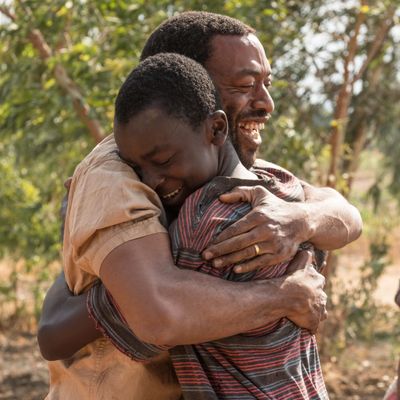
Actors’ forays into directing often come with an undue amount of baggage; decisions and vibes that would otherwise go unscrutinized can somehow have disproportionate significance. A politely told tale of ingenuity in the midst of cataclysmic hardship, The Boy Who Harnessed the Wind, based on the book of the same by William Kamkwamba and Bryan Mealer, is the directorial debut of Chiwetel Ejiofor. But perhaps the one thing it definitely has in its favor is its ability to skirt most of the telltale signs of a vanity project. Though he co-stars in the film (he plays the father to the titular boy) he manages to stay out of its limelight. But despite this, or perhaps because of it, the film remains too mannered for its own good; it’s unquestionably nice and well-intentioned, but lacking momentum.
First-time Kenyan actor Maxwell Simba plays William, a 13-year-old boy living in a small farming village in Malawi when bad weather leads to a deadly famine in his community. William has an affinity for engineering and physics, but his education is spotty due to his farming family’s unreliable income. After being expelled for not paying tuition, he manages to negotiate an arrangement whereby he can sneak into the school library and study on his own. He’s been making side change fixing his friends’ radios and batteries, but eventually comes upon an innovation that could save his town: creating a windmill-power generator that irrigates the parched fields his family and neighbors tend to.
The head-to-head resistance William meets along this journey is mostly relegated to the film’s final quarter; most of Ejiofor’s two-hour film tracks William’s eked-out education among worsening environmental conditions. There is also political unrest between the farmers and the new democratic powers in Malawi that bilk them out of their earnings. Ejiofor creates some stirring images of these political currents: at one point, the entire village running desperately with empty baskets to collect government-issue grain at the peak of the drought, and it feels as quintessential an image of hunger as any. But famine and crop prices are — no pun intended — dry subjects to pin a feature-length tale on. The interpersonal, intergenerational battles about how to address the crisis, particularly between William and his father Trywell (Ejiofor) don’t really start cooking until the movie is nearly over.
The biggest detriment to The Boy Who Harnessed the Wind might be its title; sooner or later, we can be assured, the boy in question will harness that wind. That assurance carries us through much of the direr chapters of the story, but it also takes a bit of air out of its sails, for lack of a better metaphor. The film serves as effective messaging for the virtues of education; Trywell imploring William to “Go to school” serves as the bookend for the film. It’s clear that William’s story is being framed less about the irrigation of one town’s crops, and more about a broader battle for people, particularly in underdeveloped countries, to have access to the education that can benefit their communities. We know that to be true intellectually, but Ejiofor never sells us emotionally on it; school itself is never actually presented as the life-changing, horizon-broadening experience it needs to be for William’s story to feel like it has stakes.
To be fair, this is hard stuff to translate to cinema — it needs character definition and tension and longing and all those things that aren’t going to be in a mere sequence of the events in Kamkwamba’s life as they happened. The Boy has moments, particularly in its many dusky-blue dark nights of the soul. (Cinematographer Dick Pope does some lovely work in the film’s evening hours.) But it feels more than anything else to be destined for junior-high science classrooms — which, if the film reinforces anything, is a noble venue in its own right.

